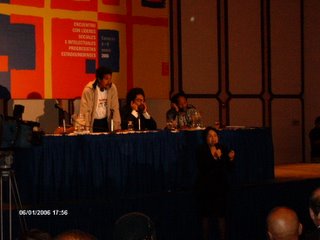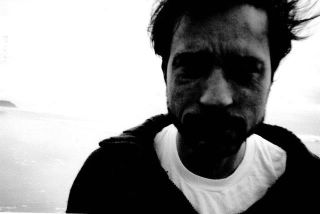The Day Cornel West Came To See Me

At first, it might not seem like Harry Belafonte, Cornel West, and others, including Dolores Huerta, coming to Venezuela has anything directly to do with a project directed at celebrating, discovering, and displaying the diversity of Latin American communities.
But, you know, it`s always nice to have these folks come and visit you anyway. Makes you think you`re in the right place at the right time.
 They were here as part of the run up to the World Social Forum January 24 to 29 here in Caracas, for a conference of progressive US leaders of color against racism.
They were here as part of the run up to the World Social Forum January 24 to 29 here in Caracas, for a conference of progressive US leaders of color against racism. Though the event was held at the Caracas Hilton, and the attendees were definitely better off Caraqueños. The event didn`t exactly feel like a socialist revolution. Nevertheless, West, true to his Liberation Theological intellectual background, gave a fiery speech, in English, about the role of US progressives in the Bolivarian Process.
I could remark at length in criticism, but that wasn`t what it was about... what was useful to me, taking serious note of the privilege at this event, were some of the sentiments that play directly into the one-sided dialogue that has unfolded on this blog.
- At one point, the Princeton professor of Theology said that it`s not about the color of your skin, it`s about your values and beliefs, and what you`re working for. Obviously true, and so good to hear as a white person struggling with his presence in Latin America. But also, not taking into account the existing inequality which makes things complicated when white folk and people of color try to work together.
- That we needn`t think that the Bolivarian process is the right answer for always. West often refers to Socratic thinking in his public speaking, and on Friday, January 6th, he invoked the questioning process, the risk that it requires, and the risk involved in the Bolivarian experiment.
- He mentioned often the millions of "Americans" who don`t support Bush, and the crowd seemed to really enjoy every jab at the US administration, and the notion that people in the states might be looking to the changes in Latin America with hope - hope for a multipolar world, hope for a foreign policy landscape that really can change the systems that maintain violent inequality, and nourish democractic organizing instead of crushing it for profit.
- And my favorite point among many: that he doesn`t like to say he`s optimistic. Optimism, he said, is "spectatorial". Optimism watches TV or listens to the radio and says, I think things are going to turn out ok in Venezuela. Hope, on the other hand, is participatory, and risky. Hope requires you to get your hands dirty, and show some solidarity by getting yourself involved in the risk.


2 Comments:
hmm, that's interesting. Derek Jensen has written about how hope is bad because it's a passive activity, it's waiting to see if something you have no control over happens. Those of us who can afford to have plenty to eat, we don't hope we have dinner tonite, we make sure that somehow, we get dinner. Hope is like when you're helpless or you think you are.
In fact the word for hope and wait in spanish is the same.
Very interesting, and I have enjoyed reading through your Blog archives, I have recently posted an article on West's books Race MAtters and Democracy Matters.
Check it out at:
www.debaterelatepontificate.blogspot.com
Post a Comment
<< Home